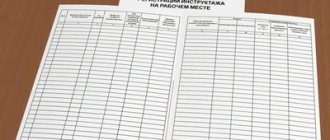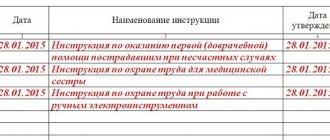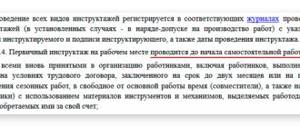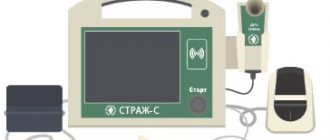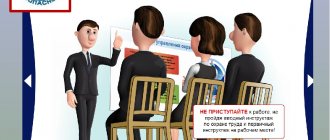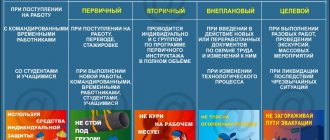Initial briefing is a procedure that must be completed during employment, transfer, temporary replacement or business trip. The requirement applies to almost all employees, with some exceptions. Representatives of what professions are exempt? Why? The questions are interesting, even if your first job is still several years away.
What is initial training and why is it needed?
Safety is the top priority in any activity. Whether it's air travel or working in a company. Minimizing production risks is the responsibility of every employer, and the state strictly monitors its compliance.
In particular, there is a special Procedure for training in labor safety. It was approved by the Ministry of Labor and Social Development. According to the Procedure, the employer is obliged to provide safety instructions to everyone who:
Applying for work.
Seconded to the company temporarily.
Sent by a third party to perform specific work.
Stays at the enterprise for practical training.
As you can see, your first briefing is not as far away as it might seem, because there will be practical training ahead.
Exceptions to the rules
So, the purpose of initial instruction (PI) is to take care of labor safety. At the same time, one must understand that such lectures require certain costs, because responsible employees spend time preparing and conducting them. And a person, for example, remains to work in the office, where his job functions do not involve any risk. Is it possible to optimize the use of human resources? Yes, sure.
Resolution of the Ministry of Labor and Social Development No. 1/29 of January 13, 2003 contains paragraph 2.1.4, which states that employees whose work does not involve the use, adjustment, testing or repair of equipment can be exempted from PI. Those who are not involved in the storage of raw materials and supplies can also be considered exempt.
Decor
Please note: can be released does not mean automatically released. There is no list of professions approved by law that are exempt from initial instruction. Each enterprise has its own, drawn up and approved by management.
Employees exempt from initial training.
Home Favorites Random article Educational New additions Feedback FAQEmployees whose work is not related to the maintenance, operation, testing, repair and adjustment of equipment, the use and storage of raw materials and materials, and also does not involve the use of electrified or other tools are exempt from initial instruction at the workplace.
Of course, it is better for all employees to formalize initial training at the workplace. But, if the organization has employees who are exempt from initial training at the workplace, then the list of their positions must be approved in advance.
The initial training program approved by the employer includes:
· familiarizing workers with existing harmful or dangerous production factors;
· study of labor protection requirements contained in labor protection instructions, local regulations of the organization, operational and technical documentation, as well as the use of safe techniques and methods of performing work.
As a rule, the same person instructs and tests the employee’s knowledge. The inspection is carried out orally, the fact of conducting instructions and testing knowledge is recorded in a journal or work permit.
The fact of the briefing is confirmed by the handwritten signature of the employee and the person who conducted it, and the date of its conduct is indicated.
Unscheduled briefing.
To formalize an unscheduled briefing, an order or instruction is issued, which must indicate the employees with whom it will be carried out, the reason for such briefing, its program and responsible persons.
Unscheduled briefing is carried out directly by the work supervisor in the following cases:
1. when making changes or introducing new regulatory legal acts or instructions on labor protection;
2. when upgrading or replacing equipment, tools or devices;
3. when technological processes change;
4. at the request of officials of state control and supervision bodies;
5. in case of violation of labor protection requirements by employees;
6. during a break in work (by decision of the employer; more than 30 calendar days for work in hazardous working conditions; more than two months).
Targeted instruction.
Targeted instruction on labor protection, as a rule, is formalized by an order to carry out work with the issuance of a work permit for persons who participate in the work.
Targeted instruction on labor protection is carried out when:
· performing one-time work;
· liquidation of natural disasters and consequences of accidents;
· carrying out work for which a permit, work permit or other special documents are issued;
· holding public events in the organization
Return to work schedule
| FULL NAME | Qualification | |||||||||||||
| Valov N.N. | Chef | 11-23 | 11-23 | 11-23 | Exit | Out | 11-23 | 11-23 | 11-23 | Exit | Exit | 11-23 | 11-23 | 11-23 |
| Zhilin D.E. | Cook 6th category | out | 10-22 | 10-22 | 10-22 | Out | Exit | 10-22 | 10-22 | 10-22 | Exit | Exit | 10-22 | 10-22 |
| Petrov A.S. | Cook 5th category | Exit | Exit | Exit | 11-23 | 11-23 | Exit | Exit | Exit | 11-23 | 11-23 | Exit | Out | Exit |
| Pronin D.V. | Cook 5th category | 10-22 | 10-22 | Exit | Exit | Exit | 10-22 | 10-22 | Exit | Exit | Exit | 10-22 | 10-22 | Exit |
| Sokov Yu.K. | Cook 5th category | 10-22 | Exit | 11-23 | Exit | 10-22 | Out | 11-23 | Exit | 10-22 | 11-23 | Exit | 11-23 | Exit |
| Chekalina N.K. | Cook 5th category | 11-23 | Exit | Exit | 11-23 | 10-22 | 11-23 | Exit | 10-23 | Exit | 10-22 | 11-23 | Exit | 11-23 |
| Aksenov N.N. | Cook 4th category | Exit | 11-23 | Exit | 10-22 | Exit | 11-23 | Exit | 11-23 | Exit | 10-23 | Exit | 10-23 | Exit |
| Bocharov S.K. | Sous-chef | Exit | Exit | 11-23 | 11-23 | Exit | Exit | 11-23 | 11-23 | Exit | Exit | 10-22 | 10-22 | Exit |
| Golenko O.V. | Sous-chef | 11-23 | 11-23 | Exit | Exit | 11-23 | 11-23 | Exit | Exit | 11-23 | 11-23 | Exit | Exit | 11-23 |
| Prokofiev V.D. | Administrator | 11-23 | 11-23 | 11-23 | Exit | 11-23 | 11-23 | 11-23 | Exit | Exit | 11-23 | 10-22 | Exit | Exit |
| Rogova G.V. | Dishwasher | Exit | Exit | 11-23 | 11-23 | Exit | Exit | 11-23 | 11-23 | Exit | Exit | 10-22 | 11-22 | Exit |
| Terentyeva V.I. | Dishwasher | Exit | Exit | 11-23 | 11-23 | Exit | Exit | 11-23 | 11-23 | Exit | Exit | 11-23 | 10-22 | Exit |
| Yakusheva I.V. | Dishwasher | 11-23 | 11-23 | Exit | Exit | 11-23 | 11-23 | Exit | Exit | 11-23 | 11-23 | Exit | Exit | 11-23 |
| Shigina L.E. | Dishwasher | 10-23 | 11-22 | Exit | Exit | 11-23 | 11-23 | Exit | Exit | 11-23 | 11-23 | Exit | Exit | 11-23 |
| Simanin G.G. | Waiter | 11-23 | 11-23 | Exit | Exit | 11-23 | 11-23 | Exit | Exit | 11-23 | 11-23 | Exit | Exit | 11-23 |
| Morozova S.A. | Waiter | 11-23 | 11-23 | Exit | Exit | 11-23 | 11-23 | Exit | Exit | 11-23 | 11-23 | Exit | Exit | 11-23 |
| Login | Waiter | Exit | Exit | 11-23 | 11-23 | Exit | Exit | 11-23 | 11-23 | Exit | Exit | 11-23 | 11-23 | Exit |
| Kushnir V.I. | Waiter | Exit | Exit | 11-23 | 11-23 | Exit | Exit | 11-23 | 11-23 | Exit | Exit | 11-23 | 11-23 | Exit |
Remuneration system.
The remuneration system of any commercial organization depends primarily on the specifics of the activity being carried out. For public catering enterprises, these are various payments to employees not only in cash, but also in kind. In addition to paying wages for hours worked, employees of bars and restaurants are entitled to various compensatory payments for work beyond the established working hours. At the same time, work on weekends and holidays, as well as at night and overtime, in accordance with labor legislation, is paid at an increased rate. In order to comply with all legal norms, an accountant needs knowledge not only of the Labor Code of the Russian Federation, but also of the specifics of labor relations with certain categories of employees. This article discusses the procedure for paying individual compensation accruals from the perspective of labor and tax legislation, as well as other pressing issues of remuneration that an accountant has to face in practice.
Legal aspects of regulating labor relations Labor relations at public catering establishments are regulated by: - the norms of the Labor Code; — collective agreement; — local regulations (regulations on labor standards, on remuneration, on bonuses, orders and instructions on guarantees and compensation when performing official duties); - an employment contract concluded with the employee. Concluded contracts, agreements and other regulations cannot contain conditions that reduce the level of rights and guarantees established by labor legislation.
Collective agreement A collective agreement is a legal act regulating social and labor relations in an organization. Therefore, it needs to be given special attention, since this document can act as a guarantor of the protection of the rights and interests of employees. As the experience of audits shows, collective agreements are not always concluded at enterprises. However, this is not a violation of labor legislation: according to Art. 40 of the Labor Code of the Russian Federation, as well as Law N 2490-1, the employer is not obliged to conclude a collective agreement with representatives of the workforce if the employees or the employer himself have not come up with this initiative. Nevertheless, at enterprises a collective agreement is necessary; it regulates issues of wages, labor regulations and other rights and obligations of employees and the employer. In addition, this document plays an important role in matters of taxation of payments and remunerations of employees, since the provisions of tax legislation are based on labor law norms. In particular, when taxing profits, expenses must be provided for by legal norms, collective and (or) labor agreements (Article 255 of the Tax Code of the Russian Federation). Law of the Russian Federation of March 11, 1992 N 2490-1 “On collective agreements and agreements.”
Employment contract One of the features of an employment contract is its compliance not only with the Labor Code, but also with the collective agreement. An employee applying for a job should pay attention to the term of the employment contract. As a rule, a contract is concluded for an indefinite period, and only in cases established by law is it possible to draw up a fixed-term employment contract. However, as noted in paragraph 13 of the Resolution of the Plenum of the Armed Forces of the Russian Federation No. 2, Art. 59 of the Labor Code of the Russian Federation provides for the right, and not the obligation, of the employer to enter into a fixed-term employment contract. At the same time, the employer is obliged to prove the existence of circumstances that make it impossible to conclude an employment contract with an employee for an indefinite period. In the absence of such evidence, it is necessary to assume that the employment contract is concluded with the employee for an indefinite period. Resolution of the Supreme Court of the Russian Federation of March 17, 2004 N 2 “On the application by the courts of the Russian Federation of the Labor Code of the Russian Federation.” According to the opinion of the capital’s tax authorities, expressed in Letter No. 20-12/52413 dated July 21, 2005, the norms of the collective agreement, labor regulations, provisions on bonuses and other regulations of the organization must be reflected in a specific employment contract. If the employment contract does not include certain accruals or there are no references to them, then such accruals cannot be accepted for profit tax purposes. The explanation given by Moscow tax officials cannot be called news. This position is based on the provisions of clause 5.2 of the previously existing Methodological Recommendations for the Application of Ch. 25 of the Tax Code of the Russian Federation <3> (lost force with the entry into force of Order of the Federal Tax Service of Russia dated April 21, 2005 N SAE-3-02/ [email protected] ). However, the instructions were canceled, but the position of the tax authorities remained unchanged. Therefore, we recommend that organizations include in employment contracts references to the norms of the collective agreement and other local acts on remuneration, if they do not reflect the procedure and conditions for remuneration of the enterprise’s employees. Order of the Ministry of Taxes and Taxes of Russia dated December 20, 2002 N BG-3-02/729 “On approval of the Methodological Recommendations for the application of Chapter 25 “Income Tax of Organizations” of Part Two of the Tax Code of the Russian Federation.”
Remuneration system The remuneration system for employees of commercial organizations is established by a collective agreement, agreements and other local acts of the organization (Article 135 of the Labor Code of the Russian Federation). At public catering establishments, as a rule, a tariff system of remuneration is established based on salaries and tariff rates. In addition to payment for time worked, various additional payments of an incentive and compensatory nature may be added to the established salary in accordance with the norms of labor legislation: bonuses for labor results, bonuses for professional skills, for class, and other incentive payments in accordance with the collective agreement (remuneration regulations). Also, accruals of a compensating and incentive nature include additional payments for work in conditions deviating from normal, wages for performing work of various qualifications, and combining professions.
Additional payments for working conditions At public catering enterprises, the accountant most often encounters difficulties in calculating and taxing additional payments associated with work beyond working hours. Let us consider the features of calculating these additional payments to employees in various non-standard situations.
Additional payment for work on weekends and holidays Involving catering workers to work on weekends and holidays is typical for bars and restaurants. In accordance with the norms of the Labor Code of the Russian Federation, employees of these establishments are given two days off for a five-day work week, and one day off for a six-day work week (Article 100 of the Labor Code of the Russian Federation). The procedure for remuneration on weekends and non-working days, determined by Art. 153 of the Labor Code of the Russian Federation, applies to all employees regardless of the working hours established for them. Piece workers must be paid for work at no less than double piece rates; workers who are assigned hourly (daily) wages must be compensated at least twice the hourly (daily) rate. As you can see, the calculation of payment for work on weekends (holidays) is carried out in one step and does not raise any questions for the accountant regarding the calculation of such payments. Difficulties arise when calculating the wages of workers with a permanent salary who go to work on weekends or holidays, as well as workers with summarized working hours, for whom work on these days can be planned by a shift schedule.
Previous7Next
How is release processed?
If the employer decides that one of his employees does not need an initial lecture on labor safety, he can issue an appropriate order with a list of professions exempt from instruction.
This document must indicate:
Name, number and date of publication.
Name of the organization.
Reason for publication.
The essence, in this case, is the approval of a list of positions whose representatives may not undergo the PI.
Directly a list of professions exempt from instruction.
The order must be signed by the manager.
Refusal of instruction - pitfalls
Although the law gives company managers some freedom in organizing occupational safety, it is useful for employers to remember that even office workers are at risk of injury. After all, they use office equipment, stationery and other tools.
Yes, they may not be instructed, but if an accident does occur, all responsibility will lie with the employer.
